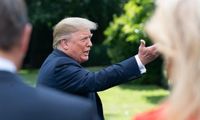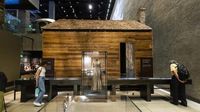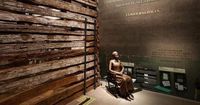President Donald Trump has ignited a fierce national debate with his administration’s sweeping review of the Smithsonian Institution, the world’s largest museum complex, accusing it of focusing too much on America’s darkest chapters—especially slavery—and not enough on the country’s successes. The move, announced in mid-August 2025 and confirmed by Trump in a Truth Social post on August 19, comes as the United States readies for its 250th anniversary in 2026, a milestone that has brought renewed scrutiny to the stories the nation tells about itself.
"The Smithsonian is OUT OF CONTROL, where everything discussed is how horrible our Country is, how bad Slavery was, and how unaccomplished the downtrodden have been -- Nothing about Success, nothing about Brightness, nothing about the Future," Trump wrote. He added, "We are not going to allow this to happen, and I have instructed my attorneys to go through the Museums, and start the exact same process that has been done with Colleges and Universities where tremendous progress has been made." According to ABC News, Trump’s directive puts White House lawyers in charge of reviewing museum content, with an explicit goal to highlight more of America’s "brightness" and less of its "woke" narratives. "This Country cannot be WOKE, because WOKE IS BROKE. We have the 'HOTTEST' Country in the World, and we want people to talk about it, including in our Museums," Trump declared.
The White House’s review, as reported by CNN and Al Jazeera, is targeting eight of the Smithsonian’s 21 museums, including the National Museum of African American History and Culture, the National Museum of American History, and others. The administration has requested a sweeping array of materials, from internal emails to copies of every placard and gallery label currently on display. The stated aim, according to a letter sent to Smithsonian Secretary Lonnie Bunch III, is to "ensure alignment with the President’s directive to celebrate American exceptionalism, remove divisive or partisan narratives, and restore confidence in our shared cultural institutions."
While the Smithsonian receives most of its funding from Congress, it operates independently in curatorial decision-making. The Organisation of American Historians (OAH) has voiced "deep concern and dismay" over what it calls an "unprecedented" request from the White House, stating, "no president has the legitimate authority to impose such a review." The OAH added, "it is particularly distressing to see this effort of historical censorship and sanitising tied to the 250th anniversary of the nation’s founding." PEN America, a freedom of expression advocacy group, echoed these worries, with Washington, DC managing director Hadar Harris stating, "The administration’s efforts to rewrite history are a betrayal of our democratic traditions and a deeply concerning effort to strip truth from the institutions that tell our national story."
The National Museum of African American History and Culture, opened in 2016 under President Barack Obama, is a particular focus of the review. Its exhibits, ranging from a plantation cabin from South Carolina to Chuck Berry’s iconic red Cadillac, are designed to showcase the "richness and diversity of the African American experience," per the museum’s website. Lonnie Bunch III, the first African American to serve as Smithsonian secretary, has repeatedly emphasized the necessity of confronting the full scope of American history. As he told Smithsonian Magazine, one purpose of the museum "was to help a nation understand itself — an impossible task without the full recognition of the horrors of slavery."
Despite this, Trump’s stance has shifted from his earlier praise of the museum. During his 2017 visit, he called it "incredible," "done with love," and a "truly great museum." He lauded abolitionist figures like Sojourner Truth, Harriet Tubman, and Frederick Douglass, recounting stories he learned there and calling the tour "a meaningful reminder of why we have to fight bigotry, intolerance and hatred in all of its very ugly forms." Yet, in 2025, his message has turned sharply critical, arguing that the Smithsonian’s focus on the nation’s faults undermines unity and pride.
According to CNN, the White House’s review is not just about content, but about process. The administration has asked for details on how exhibits are selected, how narratives are constructed, and what standards are used to determine what is displayed. Janet Marstine, a museum ethics expert, told CNN that the demands "set the Smithsonian up for failure" due to the sheer scope and short timeframe. "Nobody could provide those kinds of materials in such a comprehensive way, in that short amount of time, and so it’s just an impossible task," she said.
The Smithsonian, for its part, has declined to comment directly on Trump’s remarks or the specifics of the review as of August 19, 2025. However, the institution has stressed its commitment to a nonpartisan, unbiased presentation of history, telling CNN in July that it "will make any necessary changes to ensure our content meets our standards." The Smithsonian is governed by a 17-member Board of Regents, chaired by Chief Justice John Roberts, and is not an executive branch agency, making the legal limits of presidential intervention somewhat murky.
Trump’s campaign against "woke" narratives is not limited to museums. As reported by Al Jazeera and CNN, his administration has aggressively targeted colleges and universities, threatening and in some cases executing cuts to federal funding over issues ranging from pro-Palestinian protests to diversity, equity, and inclusion policies. In July 2025, Columbia University agreed to pay $221 million and Brown University $50 million to settle government probes, both accepting new requirements on how certain topics are taught. Harvard University is currently suing the administration to halt the freezing of $2.3 billion of its federal funds.
Earlier this year, Trump signed an executive order placing Vice President JD Vance and Interior Secretary Doug Burgum in charge of "removing improper ideology" from Smithsonian exhibits. Lindsey Halligan, a former Trump legal team member, was also tasked with helping to "root out improper ideology" at the museums. The Institute of Museum and Library Services and the National Endowments for the Arts and Humanities have already canceled tens of millions in federal grants, affecting smaller museums, libraries, and academic initiatives nationwide.
Debate over the review has been fierce. On CNN’s NewsNight with Abby Phillip, podcast host Jillian Michaels argued that Trump is not attempting to whitewash slavery, stating, "You cannot tie imperialism and racism and slavery to just one race, which is pretty much what every single exhibit does... Every single thing is like, ‘Oh, no, no, no, this is all because White people bad,’ and that’s just not the truth." Others, however, see the administration’s push as a dangerous step toward historical censorship and an attempt to recast the nation’s past for political gain.
As America approaches its 250th birthday, the struggle over how the country’s story is told—warts and all—has never felt more urgent. The outcome of the Smithsonian review may well shape the next generation’s understanding of what it means to be American.






